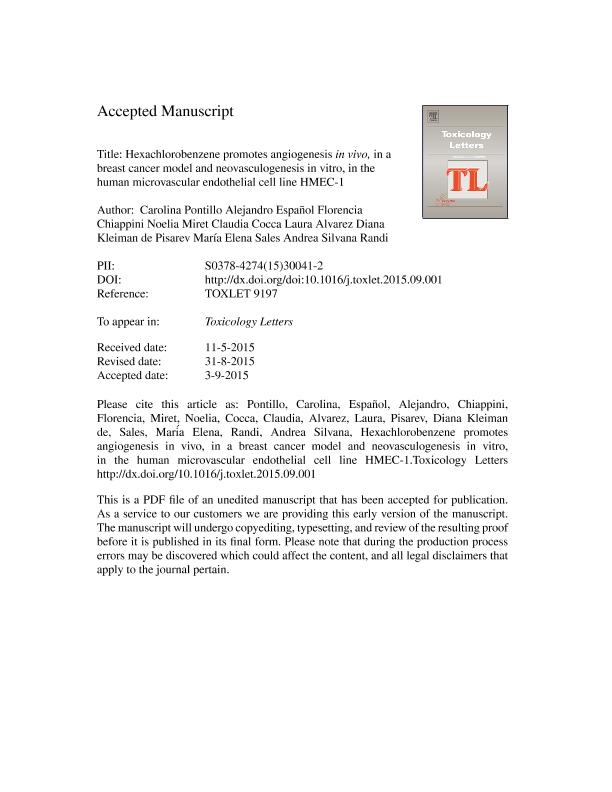Artículo
Hexachlorobenzene promotes angiogenesis in vivo, in a breast cancer model and neovasculogenesis in vitro, in the human microvascular endothelial cell line HMEC-1
Pontillo, Carolina Andrea ; Español, Alejandro Javier
; Español, Alejandro Javier ; Chiappini, Florencia Ana
; Chiappini, Florencia Ana ; Miret, Noelia Victoria
; Miret, Noelia Victoria ; Cocca, Claudia Marcela
; Cocca, Claudia Marcela ; Alvarez, Laura; Kleiman, Diana Leonor
; Alvarez, Laura; Kleiman, Diana Leonor ; Sales, Maria Elena
; Sales, Maria Elena ; Randi, Andrea Silvana
; Randi, Andrea Silvana
 ; Español, Alejandro Javier
; Español, Alejandro Javier ; Chiappini, Florencia Ana
; Chiappini, Florencia Ana ; Miret, Noelia Victoria
; Miret, Noelia Victoria ; Cocca, Claudia Marcela
; Cocca, Claudia Marcela ; Alvarez, Laura; Kleiman, Diana Leonor
; Alvarez, Laura; Kleiman, Diana Leonor ; Sales, Maria Elena
; Sales, Maria Elena ; Randi, Andrea Silvana
; Randi, Andrea Silvana
Fecha de publicación:
11/2015
Editorial:
Elsevier Ireland
Revista:
Toxicology Letters
ISSN:
0378-4274
Idioma:
Inglés
Tipo de recurso:
Artículo publicado
Clasificación temática:
Resumen
Exposure to environmental pollutants may alter proangiogenic ability and promotes tumor growth. Hexachlorobenzene (HCB) is an organochlorine pesticide found in maternal milk and in lipid foods, and a weak ligand of the aryl hydrocarbon receptor (AhR). HCB induces migration and invasion in human breast cancer cells, as well as tumor growth and metastasis in vivo. In this study, we examined HCB action on angiogenesis in mammary carcinogenesis. HCB stimulates angiogenesis and increases vascular endothelial growth factor (VEGF) expression in a xenograft model with the human breast cancer cell line MDA-MB-231. Human microvascular endothelial cells HMEC-1 exposed to HCB (0.005, 0.05, 0.5 and 5 μM) showed an increase in cyclooxygenase-2 (COX-2) and VEGF protein expression involving AhR. In addition, we found that HCB enhances VEGF-Receptor 2 (VEGFR2) expression, and activates its downstream pathways p38 and ERK1/2. HCB induces cell migration and neovasculogenesis in a dose-dependent manner. Cells pretreatment with AhR, COX-2 and VEGFR2 selective inhibitors, suppressed these effects. In conclusion, our results show that HCB promotes angiogenesis in vivo and in vitro. HCB-induced cell migration and tubulogenesis are mediated by AhR, COX-2 and VEGFR2 in HMEC-1. These findings may help to understand the association among HCB exposure, angiogenesis and mammary carcinogenesis.
Archivos asociados
Licencia
Identificadores
Colecciones
Articulos(CEFYBO)
Articulos de CENTRO DE ESTUDIOS FARMACOLOGICOS Y BOTANICOS
Articulos de CENTRO DE ESTUDIOS FARMACOLOGICOS Y BOTANICOS
Citación
Pontillo, Carolina Andrea; Español, Alejandro Javier; Chiappini, Florencia Ana; Miret, Noelia Victoria; Cocca, Claudia Marcela; et al.; Hexachlorobenzene promotes angiogenesis in vivo, in a breast cancer model and neovasculogenesis in vitro, in the human microvascular endothelial cell line HMEC-1; Elsevier Ireland; Toxicology Letters; 239; 1; 11-2015; 53-64
Compartir
Altmétricas



